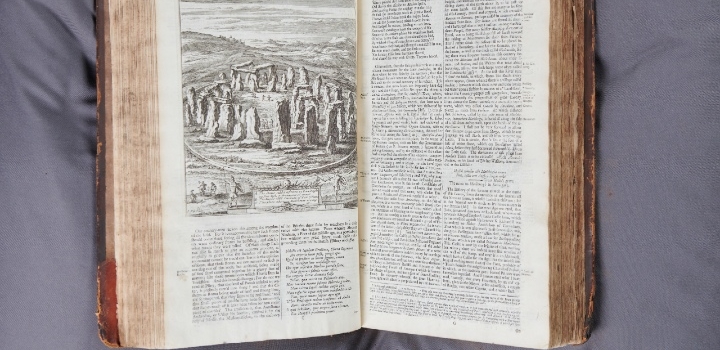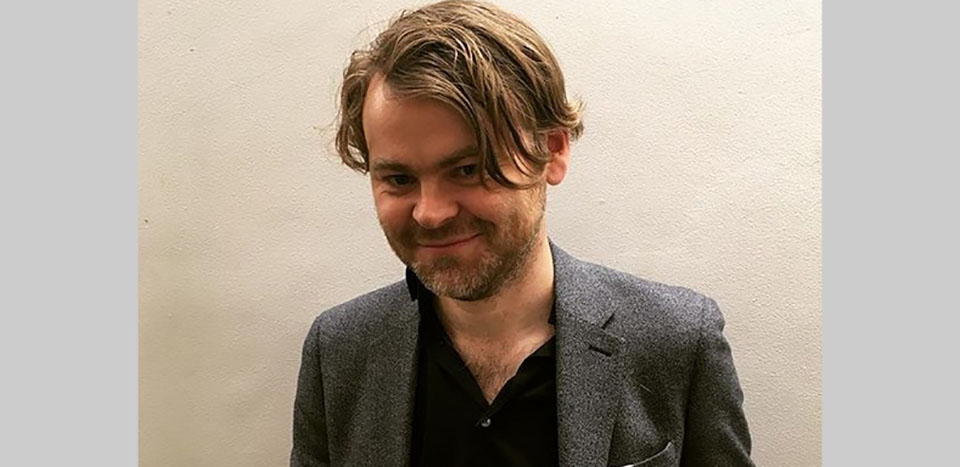Unlocking the Archive project opens historic books to new audiences
By: News Archive

Rare, ancient books from East Anglia's libraries are now available as never before, thanks to a new digital resource created by the University of East Anglia (UEA).
As heritage and cultural organisations are thinking about what public access to their collections will look like in the post-lockdown future, members of UEA’s Unlocking the Archive project, in partnership with the National Trust's Blickling Estate and Norfolk Library and Information Service, have created a digital resource to open book collections to the public in new ways. Visitors to the partners' new 'Discover Historic Books' website can explore ancient books inside and out for the first time, before making their own creative responses to those books using Renaissance typefaces, illustrations and printers’ marks.
The UEA team is working with Blickling Estate, which houses the National Trust’s largest and most significant library collection, and the Norfolk Heritage Centre and King's Lynn Public Library, which have their origins in pioneering regional libraries founded in the early 17th Century. No longer just the domain of scholars, anyone interested in history, travel, life and learning during the Renaissance can view the delicate pages of historic books from these libraries in close detail, with interactive hotpoints that make the books’ contents and contexts understandable to everybody.
The Unlocking the Archive project team has chosen an initial 24 examples from the Blickling, Norfolk Heritage Centre and King’s Lynn Library collections that contain not only historically important books, like William Camden's Britannia, but quirky and unusual titles such as In Praise of the Ass, published in 1629, and a History of Lapland (1674). The books are linked to creative activities inspired by them. Designed by graphic designers, printmakers and artists, these activities encourage families to respond imaginatively to historic books at home.
The UEA team had previously been working with National Trust volunteers to find innovative ways of engaging visitors with Blickling's historic library, but the Discover Historic Books digital resource evolved as a response to the immediate COVID-19 crisis and its longer-term consequences.
The Discover Historic Books website is part of the Unlocking the Archive project, led by Dr Sophie Butler and Dr Tom Roebuck, both lecturers in UEA's School of Literature, Drama and Creative Writing.
Dr Butler, a lecturer in early-modern literature, said: “The digital resource opens up a stunning range of beautiful, centuries-old books from these collections for people to explore. It includes ground-breaking books that changed the way Renaissance readers understood the world around them, as well as showing how learned books of the past can be relevant to urgent modern issues around nationhood, identity, trans-nationalism, women's history, and faith.
“The project will help to make these important, yet under-appreciated historic treasures available to new audiences.”
Ms Rachel Ridealgh is a community librarian for local studies in the Norfolk Library and Information Service, which holds thousands of internationally-significant books from the 15th-18th centuries, within the Norfolk Heritage Centre and the King’s Lynn Public Library.
Ms Ridealgh said: “We’re delighted that this project has enabled us to develop a new and innovative approach to sharing these historic books with the public, particularly during a time when in-person access is not yet possible.
“We hope that this will provide a template for many other historic libraries to open their collections to the public.”
Mr Sebastian Billing is the visitor experience manager for the National Trust’s Blickling Estate.
Mr Billing said: “Blickling Estate contains the largest and most impressive library in the care of the National Trust and is one of the most significant in England, with over 12,500 volumes.
“The team here are passionate about connecting more people to the collection in our care and highlighting the importance of books in all our lives, especially at this time. This new digital resource represents a fundamental shift in our ability to open up the collection to everyone in a really simple, imaginative and engaging way.
“By shining a light on our library’s past, we help to shape its present and hope to safeguard its future.”
Dr Butler said: “Our web resource will help our partner organisations combat the devastating effects of COVID-19 on their institutions by enabling them to increase their digital adaptability and providing them with a legacy of increased resilience as they work to create new forms of visitor experience during the ongoing crisis.”
To explore the Discover Historic Books website, which includes a short film about the project, go to: discoverhistoricbooks.unlockingthearchive.co.uk
Related Articles

Dr Naomi Wood wins the BBC National Short Story Awards
UEA Creative Writing lecturer and bestselling author, Dr Naomi Wood has been crowned the winner of the eighteenth BBC National Short Story Awards for her work titled ‘Comorbidities’.
Read more
Tragedy and chaos aboard the warship Gloucester
The Gloucesters troubled early history, intertwining maritime heritage with national and global narratives, has been revealed by research from the University of East Anglia.
Read more
An Interview with David Nowell Smith
Professor of Criticism, David Nowell (LDC) talks about his new book W.S. Graham: The Poem as Art Object
Read more